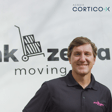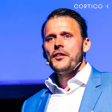Become a Creator today!Start creating today - Share your story with the world!
Start for free
00:00:00
00:00:01

The future of healthcare is digital, with Hugo Rourke
Most developed economies spend about 10% of their budgets on healthcare. About 90% of that spending goes towards people with chronic conditions. Fortunately, applications of digital and AI are improving productivity in the healthcare system, and revolutionizing the lives of patients with chronic conditions.
Hugo Rourke is at the forefront of this revolution. Hugo is the CEO and Co-Founder of Perx Health, a digital care management platform for medically complex members.
Get in touch with Acquis Cortico-X here.
Follow Acquis Cortico-X on LinkedIn here.
Learn more about Perx Health here.
Transcript
Introduction to Cortico X and Digital Transformation
00:00:00
Speaker
Aquas Cortico X is an experience-led transformation business that partners with clients and technology companies to drive digital acceleration. We are experience activists passionate about elevating everyday human experiences through the belief that what's best for people is what's best for an organization. Reach out to us for a chat. A link is in the show notes. Now cue the jingle.
Is Healthcare Spending Driven by Poor Health Management?
00:00:38
Speaker
Hello and welcome to Speaking from Experience from Aqua's Cortico X. I'm Will Kingston. Most developed economies spend about 10% of their budgets on healthcare. About 90% of that spending goes towards people with chronic conditions. It's an astonishing statistic, but that's not even the scary part.
00:01:01
Speaker
About half of that spending on patients with chronic conditions is a consequence of people not managing their health correctly. It suggests that the reactive approach of many governments to just throw more money at ailing healthcare systems may not be the answer.
00:01:18
Speaker
there may in fact be a hidden path to improving both productivity in healthcare as well as health outcomes for patients.
Perks Health: Empowering Chronic Condition Management
00:01:25
Speaker
To shine a light on that path, I am joined by the co-founder and CEO of Perks Health, Hugo Rourke. Hugo, welcome to Speaking from Experience. Hi Will, great to be here. Tell me a bit about Perks and then specifically, how does it help those patients with chronic conditions that I mentioned in those introductory remarks?
00:01:46
Speaker
For sure. And I hate to say you've stolen some of my key stats, but that's great to see. Perk's Health is a digital care management platform. Our mission is to empower people with the tools they need to manage their health conditions and motivate them
00:02:03
Speaker
to manage their health like diabetes, cardiovascular disease, or even mental health conditions. We have a team of passionate experts who are passionate about helping people make the behavior change to get better health outcomes when managing health conditions. What that means is every day, as people use our app, not only does it support them in organizing their health, but it actually makes it a positive and fun experience for them doing so.
00:02:32
Speaker
As you just mentioned, about half of the spend on people managing health conditions can be attributed to poor self-management of these conditions. And that offers up the potential to avoid health care costs, whether that's hospitalizations, escalating disease risk, or additional medication burden, just by helping people implement the treatment plans that they've already been given.
00:02:55
Speaker
So make this real for me. Let's say you're a patient with type 2 diabetes. They are a user of the Perks app. What does that look like? What are they doing to engage with the app? What are they getting out of it? Paint that picture for me.
How Does Perks Improve Health Management?
00:03:10
Speaker
Sure. So the first thing to recognize is that we partner with large health plans to implement our programs. So the people who come to our app are recommended it by their health plan or other insurer involved in their health care. When people enter our program,
00:03:25
Speaker
say for diabetes, as you, as you mentioned, we know that diabetes has a complex treatment regimen. It often involves multiple medications, multiple times a day, taking measurements like glucose and weight and doing other things to help with your health, such as lifestyle interventions, like exercise. What perks does is essentially three things. The first is it lays out that treatment plan in the one user experience.
00:03:53
Speaker
Healthcare generally is incredibly fragmented. So there's a huge amount of value in bringing all those different parts of a treatment plan together in the one user experience that actually matches the lived experience of managing diabetes. The second thing that Perks does is even more critical, which is that we make it motivating to get through that task list every day.
00:04:15
Speaker
For some people, that's winning gift cards in our app that make it extrinsically exciting to do those tasks. For some people, it's being part of a supportive community in our app to help them manage their health. And for some people, it's the intrinsic motivation of reaching a 100-day streak of perfect health management. We believe that different people are motivated by different things.
00:04:41
Speaker
Some people it is more extrinsic, some people is more social, and some people it's more intrinsic. And perks exist to bring all those different motivators into healthcare to finally make healthcare an engaging and positive experience. The third part of perks is leveraging those different motivators and using AI to adapt them to the individual.
00:05:06
Speaker
As you can imagine, if people are using perks every day of their life as they manage their health, we learn not only a lot about it, their health care.
00:05:14
Speaker
but also a huge amount about what motivates them as individuals. And so the Perks app experience actually adapts depending on how you're using Perks. Well, if you're the kind of guy who wants to come into Perks and win gift vouchers, then the Perks app experience will adapt itself to play to that streak. Whereas if I'm coming in and always checking my streak and seeing how I'm going on the leaderboard because I'm more competitive,
00:05:39
Speaker
then Perk's experience will adapt itself to play up the streak and play towards the leaderboard when it comes to motivating me and getting me to do my health tasks. We believe this is the secret source of digital, but it can truly personalise to the individual, not just what they have to do, but actually how they're going to go about doing it every day of their life.
00:06:00
Speaker
I'm keen to follow up on the use of AI to create more personalized experiences. But before we do the second limb there around motivation, the interesting thing for me as I look at your business is that it is not just about digital innovation. It is just as much about behavioral innovation. How have you gone about embedding behavioral science into your business and how you then deliver the experience to patients?
AI and Behavioral Science in Health Apps
00:06:29
Speaker
So I think there's two key streams to the work we do. So one is that we want to be closer and understand those patients better than these health organizations do themselves. One of the best things we did at Perks was spend the first six months getting around health care, talking to doctors, nurses, pharmacists, health care administrators, hospital operators.
00:06:50
Speaker
But most importantly, spending time with patients, watching as they implemented their health care. And by truly understanding that lived experience, we're able to come to realizations about what would help them manage their health. For example, you mentioned diabetes before.
00:07:06
Speaker
And in Australia, where PERC started, 85% of people managing type 2 diabetes are managing at least one other health condition. And so it doesn't make sense to really make a diabetes-specific app when the vast majority of that community needs to manage two or more, often three, four, five different health conditions. And that kind of insight
00:07:28
Speaker
made us create an app that is polychronic in nature, rather than fitting to the siloed norms of healthcare as it exists today.
00:07:37
Speaker
But you mentioned the other part of perks, and that's the second key thing about working to create this behavior change with individuals, and that is using behavioral science. Again, not a thing that's commonly used in healthcare. If you think about healthcare behavior change, it's probably your doctor trying to tell you what to do and potentially being handed a pamphlet about managing diabetes on your way out of the clinic.
00:08:02
Speaker
Where Perks comes from, and this goes to the experience of myself and my co-founder Scott Taylor, is using behavioral science and the principles of consumer engagement that are used so commonly in other industries outside healthcare to drive better behavioral compliance in healthcare. My background is working with companies like retail loyalty programs in consumer promotions for packaged goods and even mobile games and casino gaming.
00:08:32
Speaker
And what that taught me is that there are companies out there that are very good at applying behavioral science and applying consumer engagement to create behavior change. And the opportunity we went after at Perks is to use those very same tactics to drive behavior change for good in healthcare to ultimately help people live longer, healthier lives. Yeah, I think it's fascinating and you're right that I think
00:08:57
Speaker
There are other industries which are further ahead at the moment in the behavioral space. One of my favorite businesses is the FinTech Lemonade, and they have a chief behavioral officer who is specifically responsible for embedding behavioral science principles into the work that they do. It's an interesting evolving role. Let's go to that other pillar, the pillar around AI.
00:09:22
Speaker
Every conversation that I'm having in the market now seems to end up with AI in some way, shape, or form. How are you thinking about how AI will impact your business into the future, as well as, of course, impacting the experience of patients?
00:09:39
Speaker
So I think it's going to be huge and it's only upside for a company like Perks where we already have the platform to adapt to an individual. We've been using machine learning in Perks since about 2018 to try to figure out what is motivating individuals.
00:09:55
Speaker
and then personalize that experience to them. We started very early in that journey when we were a really small team, but we knew building that capacity to be able to use computational science to figure out and improve our product was going to be key to not only making a good product today, but making a better and better product every month, every year as we work with our customers, but ultimately as we work with tens of thousands of individuals to manage their health care.
00:10:25
Speaker
Anyone doctor or anyone nurse can only work with hundreds of patients in a year and maybe a couple of thousand over a lifetime. But the data set we already have about how people manage their health every single day of their lives and how they stay motivated in managing their health is quite unique and proprietary to figure out how to improve over time. So that kind of
00:10:48
Speaker
categorical AI using machine learning is something that's been used a bit in industry, but Perks has really been bringing it to the forefront and ultimately making it available to the insurers and health partners that we work with in a way that they might not be able to build internally and they certainly don't have the expertise or the data set to release that within a few months like they can with Perks. Do you think about
00:11:13
Speaker
that as a commercial offering to insurers, or is this just a value add to help facilitate that relationship that you may have with them? We think it is core to our program. Our program promises better behavior change than without it, and we're lucky to have proven that in clinical trials. But the way to do that best is not for
00:11:37
Speaker
our product designer or our engineers to create logic rules about what happens when in the app, but it's actually to use machine learning and artificial intelligence systems to adapt that experience.
Validating Health Apps Through Clinical Trials
00:11:50
Speaker
You mentioned clinical trials, and this is something, again, which I've been interested in with perks is that you've put your money where your mouth is and actually said, we're going to try and test this rigorously to show that our app works. Tell me about what you've done in that space.
00:12:05
Speaker
For sure. So we always knew that operating in healthcare, just having a good product that works for participants and having a product that might work for customers is actually not enough. If we want to prove our value in healthcare, we have to put it to the test, just like you would a new treatment regimen in a hospital or a new drug as you bring it to market.
00:12:27
Speaker
And so very early in perks, we went out and conducted a randomized controlled trial to see if giving perks to a population of lower socioeconomic status, government reimbursed individuals would improve their healthcare outcomes, managing diabetes and associated health conditions.
00:12:49
Speaker
And what we're able to show is that firstly, people adopt to perks. Secondly, they maintain use of it for over 12 months, which is a huge amount of engagement when they're using it three or four times a day. And then thirdly, that actually at the end of those 12 months, when you look at some of their key behavioral outcomes, when you look at some of their key blood outcomes, so the actual biomarkers in their body, that they've improved their management of diabetes, and they've improved their management of other conditions like heart disease.
00:13:19
Speaker
We've gone on from there and done more studies in a range of different spaces from cystic fibrosis to chronic obstructive pulmonary disease to mental health management to workers injury recovery, all showing that the one solution that drives that better behavioral compliance
00:13:37
Speaker
actually dramatically improves outcomes. And that's not crazy because in medicine we spend a lot of money proving that treatments work and training doctors to assign those treatments. What Perks does is it kind of doubles the bang for your buck by taking those existing treatments and existing expenses on health professionals and actually making sure that people do them every day of their lives. So we've seen that play out time and time again in clinical trials.
00:14:02
Speaker
The product works, we know that, but there are a lot of great products in startup world which have ultimately fallen by the wayside. There's more to it, and that is how do you actually build a successful business?
Balancing Growth and Profitability in Health Tech
00:14:13
Speaker
There is this constant tension in this space between growth and profitability. It would seem that investors are paying more attention to
00:14:23
Speaker
profitable business models as the macroeconomic climate becomes more uncertain. How have you thought about that balancing act as a CEO? So it's always a source of constant tension about how fast to go and how hard to push.
00:14:40
Speaker
Being in healthcare, being in serving insurers and being in enterprise solutions means that we've probably gone slower than many other direct to consumer or non-healthcare solutions might push. And it's been a case of being slow and steady wins the race. And we believe in healthcare. That's ultimately not just the right approach commercially, but it's actually the appropriate approach given that we're dealing with people's health
00:15:07
Speaker
and their lives, and what that's looked like in our experience was starting with, you know, pilot programs in Australia where I come from, expanding those, expanding nationally with some of those customers to prove that not only did this work within the state of New South Wales, but actually we could do this nationally with people that we'll never see and never know who would log in and use perks.
00:15:30
Speaker
Then during COVID, we had our first inbounds coming from the US to ask whether they could use a solution like Perkz on the ground in the US. We took the risk. It was quite hard to implement with demanding customers. This was a chain of clinics spread across multiple states.
00:15:48
Speaker
to implement from the other side of the world. But again, we're able to show you the power of digital is to be able to be with people spread across Texas or Arizona as they manage their health, all being developed back in Sydney. We've now moved a large chunk of our team into the US, and both the co-founders and much of our customer support team are in the US, where we're expanding with health plans and health systems here to support them as they roll out similar programs. But it's been that kind of
00:16:17
Speaker
slow and steady, piece by piece, building out the product, the clinical evidence base, the customer stories, and ultimately then expanding that and bringing it to a new market in the US. I'm glad we don't have another Elizabeth Holmes on our hands. The COVID
00:16:34
Speaker
situation or the COVID era was interesting for healthcare because I imagine you saw a really dramatic and very quick change in customer expectations and behaviors. So telehealth went from being something which is quite novel to something which is now just accepted as widespread. How did you see patients' needs and expectations evolving through that period and then how did you really quickly react to that?
Did COVID-19 Change Digital Health Adoption?
00:16:59
Speaker
Yeah, so we've been watching and we believe that the future of healthcare was digital.
00:17:05
Speaker
I mean, digital promises something that healthcare has never been able to do, which is actually be with that person every day as they manage their health. So we were always excited about the digital future of healthcare, and indeed we were always pushing for that to come sooner. I think what COVID managed to do was actually was less about patients and their changing expectations. I mean, when we spoke to patients back in 2017, 2018, they were already expressing frustrations that
00:17:32
Speaker
how can my doctors very analog, they give me paper prescriptions, they tell me to sit in a waiting room when quite frankly I've got other things to be doing in my life. Why can't we just do a teleconference? Those expectations were already there in a large chunk of patients, but of course that expanded through COVID as people got more used to technology. But I actually think the biggest thing it did was change the receptiveness of the industry to digital solutions. I think it's easy to sit back and
00:18:00
Speaker
not make change until you need to. And what COVID presents as an opportunity for the digital health industry and for perks was that you had finally had customers who needed to make a change, who recognized that their existing models of care that required people to come into hospital two or three times a week were not fit for purpose anymore.
00:18:19
Speaker
And so they needed to find ways to deliver healthcare programs digitally and ultimately to support people to manage those conditions and above all else, stay at a hospital because of the increased risk due to COVID. So we saw a lot happen on the customer side and finally a recognition that they could meet the needs. The patients were already asking for healthcare to move into the 21st century like other industries. So it was a really exciting time and one that
00:18:44
Speaker
Yeah, it was a roller coaster. I don't think any startup founder would wish to operate through a pandemic, but it was one that ultimately when I look back at what the team achieved in that time, it's something that we're really proud of. I think that's a nice articulation of the tremendous advantages that digital can provide in this space.
Complementing Human Healthcare with Technology
00:19:01
Speaker
A digital detractor may say that you lose the human element through digital solutions. How do you respond to that line of thinking? So I think it's a false dichotomy that it's digital or
00:19:14
Speaker
doctor, for example. I think Perks in particular is the model that shows that it can be both mutually reinforcing. Some people are making digital solutions to try to replace the doctor and have people only interact with a digital AI that will tell you how to make sure help. Perks' role has always been to
00:19:35
Speaker
be additional to your existing care team and your existing treatment plan, but to help you implement that treatment plan as you manage your health and therefore achieve much better outcomes than if you're left on your own. And it's the two together, one and one makes three that really excites us at Perks. And I'll give you a couple of examples of how that plays out. So a doctor might hand you over a treatment plan. In fact, two or three different doctors from different areas of your health might hand you over a treatment plan.
00:20:03
Speaker
Number one is that perks can bring together those treatment plans in one place. Two, as we've spoken about, is perks can help you actually implement those treatment plans. But the third really nice piece of perks, and this is something that definitely was amplified through the pandemic as doctors change their models of care, was that perks has amazing data on how people are managing their health care every day.
00:20:26
Speaker
Before the pandemic, best in class for, you know, medications was to look at whether people were turning up once a month and picking up their box of pills. And that tells you very little about how they're actually using those pills. Are they actually consuming them? Are they consuming them a whole lot at once and then forgetting for a few days and consuming a whole lot more, which is actually worse than not taking them at all. What Perks does is we have timestamp records of every time that someone is taking their pill. Every time they're taking a photo of it,
00:20:54
Speaker
Verifying that they're about to take that pill and so i'm gonna give back to doctors a level of data that never had before on behavior but also an outcome from things like connected devices from things like patient pool outcome which is a way to show where the people managing a condition so we're really able to.
00:21:12
Speaker
create a virtuous loop where we're not only taking the experience from the doctor and then helping people implement it, but the perks experience is then feeding back into the healthcare system and making the doctor and the clinicians also need better at their job as well.
00:21:25
Speaker
That's really interesting. And as you, you are explaining that what comes to my mind is that this model is applicable to the broader areas of wellness. So this could just as easily apply to tracking meditation, for example, or tracking exercise rituals. Is that something that you see as being on your roadmap or are you staying quite focused on the chronic health space?
00:21:49
Speaker
We're pretty focused at Perks. We think there are other great companies out there trying to solve those problems with kind of similar approaches.
Chronic Health Management Innovations
00:21:58
Speaker
For us, we've built a solution that is really focused in on understanding that person who is managing chronic health conditions, which tends to look quite a bit different from your typical kind of corporate wellness solution. So we're pretty focused on the vertical we're in, but we've always looked around
00:22:15
Speaker
for examples of products beyond clinical health care. When we thought about what do we want perks to be, we think about products like Duolingo for language learning, or the Strava community for fitness, or other solutions like loyalty programs in airlines and retail. So we're always thinking, how do we bring the best of what's outside healthcare and might already exist in the digital realm and is used for that ever change, but then apply it to the really worthy goal of helping people manage their health.
00:22:45
Speaker
It's a lovely little insight, and I think sometimes we make the mistake of saying, well, what are other people in my industry doing? How do I try and meet those sorts of competitors as opposed to looking for analogous concepts in areas that are further afield?
00:23:01
Speaker
Next, I want to just get your thoughts quickly on, on ways
Remote Work Culture at Perks Health
00:23:04
Speaker
of working. So you are a fully remote business. You now work across Australia and the US, which are not particularly hospitable time zones. How have you gone about building a culture and getting your team humming effectively? I guess with that, those constraints are with those challenges.
00:23:23
Speaker
So Perks was a semi-remote business pre-COVID and then we went fully remote through COVID. We actually prefer to talk about being a distributed team. Remote suggests that there's an office and then other people are external to that office, whereas distributed recognises the fact that we're all working from wherever we are and we have people in, you know, in the US, we have people in
00:23:45
Speaker
Nashville, New York. I'm sitting here in Boston today. We have people in Colorado. We have people down in Arizona, California. And then in Australia, we go not just on the east coast of Australia, but all the way to the west coast of Australia as well. So we span about a
00:24:00
Speaker
11-hour time zone difference from the East Coast to the US to the West Coast. That's forced on us some pretty important habits around working asynchronously, around being really thoughtful about when we do get together, and I'll probably come to that in a second, and also about documenting everything so that people aren't blocked by having to try to get in contact with someone.
00:24:22
Speaker
One of the things I like to reinforce with the team is actually if you work asynchronously and write it down today, that doesn't just share the information today, that shares it in perpetuity into the future. And so instead of what I remember from when I worked in a corporate office at the beginning of my career,
00:24:40
Speaker
of having all these little meetings where you're sharing often quite similar information with different people. If you actually force those good behaviors around asynchronous and documentation is you actually can get better collaboration if you're really purposeful. I think where a lot of businesses get stuck is they, you know, I think you have to go to, personally, I believe you have to go to either poll. You can be in person and you get the great collaboration benefits.
00:25:04
Speaker
of doing so, and I definitely don't want to deny that. Or you go to the opposite end of the scale, like perks, where you have these good habits that make the best of asynchronous, where people get the time to think, they get the time to document, and that documentation can live on. And that is, if you get stuck in the middle where you're trying to work together, but you're just spending all your day on video conferencing, sharing information verbally, then I think that's like the worst bit to be in. So we've been quite deliberate.
00:25:33
Speaker
When we do get our team together, you know, and you think about all the money companies like us would have spent on an office and we can put that to getting people, flying people together and having a great time together. And we're really purposeful about creating, you know, whether it's a few day off sites or annual retreat each year, really thinking about how do you make that a great experience? How do we get people embedded as the team connected and also connected back to our mission of helping people as they manage health conditions?
00:25:59
Speaker
Yeah, food for thought because the vast majority of businesses now are in that middle ground that you just mentioned.
Advice for Aspiring Digital Healthcare Founders
00:26:05
Speaker
Here you go, final question. You have built what is an incredibly successful business in the digital healthcare space and the only way is further up. What would your advice be to a new or aspiring founder in the digital healthcare space?
00:26:25
Speaker
So I think the common advice for founders, and it's very good advice, is to get out and speak to your customer. And I think that is 100% true when it comes to healthcare, because there's a lot of low hanging fruit problems to be solved if you get out there and speak to people. The complexity of healthcare is that there isn't just one customer. With most models that you're bringing to market, especially in digital health,
00:26:49
Speaker
is there's actually multiple parties you need to understand. You need to spend time talking to providers who provide the care and a really, really important part of delivery. You need to understand how they might get paid, whether that's by public or private insurance programs and what those insurers are looking for in terms of evidence that the solutions are working. You need to understand carers who might be around that individual or other kind of stakeholders in the system. But above all else, you've got to spend time with a patient understanding
00:27:18
Speaker
understanding their needs as they go about their health. And I think one of the problems that we fall into in healthcare is we do talk about patients as if that's all they are, but these people more often than not, they're not stuck in a hospital bed. They're going about their life day to day. Healthcare is one of many things they have to achieve. So seeking to understand what's holding them back or what's, you know, what would they like to see in their model of care is really important. So I'm generally not one to give advice because everyone's on their own journey when it comes to building.
00:27:47
Speaker
a company like Perks, but ultimately getting out there and speaking to a customer, I don't think you can go wrong with that as a first step. Emphasizing the human dimension is a lovely place to end on. Hugo, Scott and yourself have built a wonderful business and it is a business that is improving the lives of many, many people. Congratulations. Good luck for the year ahead and thank you for coming on, speaking from experience. Thanks for having me Will. It's been great to chat.
00:28:14
Speaker
Thank you very much for listening to this episode of Speaking from Experience. If you enjoyed the show, please leave us a rating and a review. And if you really enjoyed the show, reach out to us for a chat. A link is in the show notes.



















